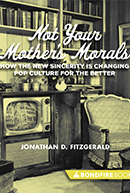Not Your Mother's Morals: An Interview with Jonathan Fitzgerald
At 31, Jonathan Fitzgerald has become one of the most thoughtful cultural observers among a rising generation of Christians. He is editor and co-founder of Patrol, an online “review of religion and the modern world,” and his articles have appeared in outlets such as The Wall Street Journal, The Atlantic, The Daily Beast, and Christianity Today. His new e-book, Not Your Mother’s Morals: How the New Sincerity is Changing Pop Culture for the Better, is a fascinating social commentary on changing moral norms that discusses the trend toward authenticity and sincerity in work, theology, music, and art. It is worth every penny of the $3.99 Amazon charges for it, and I highly recommend it. In this interview, I chat with Jonathan about morality, pop culture, and whether he believes God is “still important” today. JM: A lot of religious people—conservative Christians in particular—have a deep aversion to popular culture. After all, they say, we should be “in the world, not of it.” In your opinion, why should we care about popular culture?
JF: As strange as it is to say, I actually think that in some significant ways pop culture is taking the place that religion used to hold in American culture. Let me explain. With the proliferation of the “Nones”--those who claim no religious affiliation--the influence of religious organization as moral gatekeepers has waned significantly.
So, based on this, one would think that our society would similarly become at best amoral and at worst completely immoral. And yet, this has not happened. Certainly some thanks is due to other cultural institutions, most notably families, for passing on morality to the next generation, but in lieu of a major, unifying cultural force like religion, popular culture has really begun to fill that gap.
JM: But is this really good news? Popular culture’s morality doesn’t often have a lot in common with the traditional morality held by many religious people.
JF: While it’s true that popular culture introduces some new categories of morality and, at times, flat out contradicts what we would call tradition Judeo-Christian morality, I believe that there is actually more overlap than one might assume. This is why, in my book, I look at three major aspects of American culture -- God, Family, and Country -- and point out that pop culture actually has a lot to say on these topics. They’re still as important as ever to most of us, even if the way we think about each category has shifted a bit.
JM: Can you give an example of how God is still as important today as, say, 50 years ago?
 JF: Of course. Our collective longing for God has not gone away just because people attend church less frequently. In a number of places in popular culture, from the emotive cries of Indie rock artists to the over-the-top theatrics in the huge proliferation of super hero movies, it’s evident that we, as a society, still have a need for God.
JF: Of course. Our collective longing for God has not gone away just because people attend church less frequently. In a number of places in popular culture, from the emotive cries of Indie rock artists to the over-the-top theatrics in the huge proliferation of super hero movies, it’s evident that we, as a society, still have a need for God.
Because the Oscars have just passed, movies are fresh on my mind. Let’s take a look at the top contenders for Best Picture. Two of the biggest films of the past year, Les Misérables and Life of Pi, and to a lesser extent Beasts of the Southern Wild, consider the part that God plays in our lives. They ask questions about his existence, relevance, and level of activity. The other nominees, from Lincoln to Silver Linings Playbook to Zero Dark Thirty, raise issues of morality to the most prominent thematic level.
The point that I want to make about all of this is that the foundation that makes this kind of consideration possible, is the New Sincerity movement. By elevating the values of sincerity and authenticity to the level of significance they have achieved in our culture, we’ve opened the doors for contemporary storytellers to consider morality and spirituality in popular culture.
[ad name="a-faith-of-you-own"]
